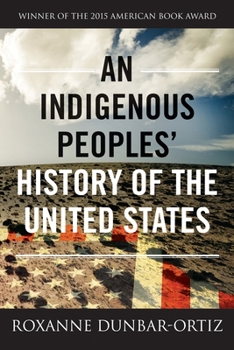An Indigenous Peoples' History of the United States
(Part of the ReVisioning American History Series and ReVisioning American History (#3) Series)
Select Format
Select Condition 
Book Overview
New York Times Bestseller Now part of the HBO docuseries "Exterminate All the Brutes," written and directed by Raoul Peck Recipient of the American Book Award The first history of the United States told from the perspective of indigenous peoples Today in the United States, there are more than five hundred federally recognized Indigenous nations comprising nearly three million people, descendants of the fifteen million Native people who once inhabited this land. The centuries-long genocidal program of the US settler-colonial regimen has largely been omitted from history. Now, for the first time, acclaimed historian and activist Roxanne Dunbar-Ortiz offers a history of the United States told from the perspective of Indigenous peoples and reveals how Native Americans, for centuries, actively resisted expansion of the US empire. With growing support for movements such as the campaign to abolish Columbus Day and replace it with Indigenous Peoples' Day and the Dakota Access Pipeline protest led by the Standing Rock Sioux Tribe, An Indigenous Peoples' History of the United States is an essential resource providing historical threads that are crucial for understanding the present. In An Indigenous Peoples' History of the United States, Dunbar-Ortiz adroitly challenges the founding myth of the United States and shows how policy against the Indigenous peoples was colonialist and designed to seize the territories of the original inhabitants, displacing or eliminating them. And as Dunbar-Ortiz reveals, this policy was praised in popular culture, through writers like James Fenimore Cooper and Walt Whitman, and in the highest offices of government and the military. Shockingly, as the genocidal policy reached its zenith under President Andrew Jackson, its ruthlessness was best articulated by US Army general Thomas S. Jesup, who, in 1836, wrote of the Seminoles: "The country can be rid of them only by exterminating them." Spanning more than four hundred years, this classic bottom-up peoples' history radically reframes US history and explodes the silences that have haunted our national narrative. An Indigenous Peoples' History of the United States is a 2015 PEN Oakland-Josephine Miles Award for Excellence in Literature.
Format:Paperback
Language:English
ISBN:0807057835
ISBN13:9780807057834
Release Date:August 2015
Publisher:Beacon Press
Length:312 Pages
Weight:1.06 lbs.
Dimensions:1.1" x 6.0" x 8.8"
Related Subjects
Activism Colonization Imperialism Racism Resistance History Social Science Social SciencesCustomer Reviews
3 ratings
This book could have had the information in it a little more organized.
Published by [email protected] , 2 years ago
This book could have had the information in it a little more organized.
Excellent and important reading for anyone
Published by Julian Cecil , 3 years ago
In accessible language, Dunbar-Ortiz provides a rigorous history- both in its content and approach to understanding history itself. The narratives are well-researched and well-told while providing thorough intellectual and linguistic framework for understanding colonization and resistance. It’s a great starting point for anyone, but still valuable to a more seasoned reader. I highly recommend!
A narrative so revisionist it staggered this attendee-product of public school.
Published by Thriftbooks.com User , 7 years ago
Her story is believable because it mirrors Inca, Mayan, and more accounts of indigenous peoples' advanced civilization in the Western Hemisphere.
She delves into that in Chapter 1
I wondered how "Indians" walked silently in the forest. Ever tried it? Well, if forest was as described in this book in the sixteenth-seventeenth century when settlers from Europe arrived then it is plausible.
Excerpts from early Chapter 3
“Many have noted that had North America been a wilderness, undeveloped, without roads, and uncultivated, it might still be so, for the European colonists could not have survived.
“Neither the technology nor the social organization of Europe in the sixteenth and seventeenth centuries had the capacity to maintain, of its own resources, outpost colonies thousands of miles from home.
“Incapable of conquering true wilderness, the Europeans were highly competent in the skill of conquering other people, and that is what they did. They did not settle a virgin land. They invaded and displaced a resident population.
“This is so simple a fact that it seems self-evident.”






